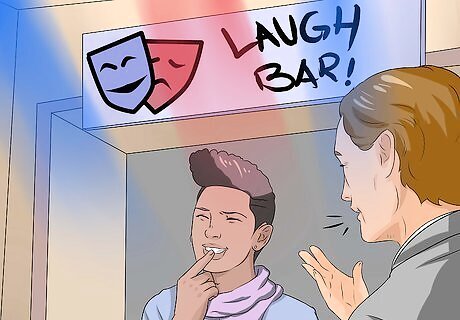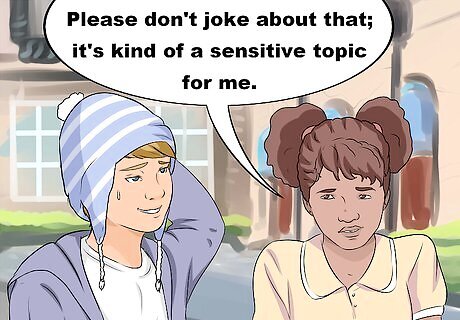
views
Considering the Joker's Intent

Assume the best of others. Try to remember that most jokes are good-natured attempts at being funny. Sometimes, we take the cheapest route to funny, and that sometimes takes the form of taking a shot at someone. If the shot's aimed at you, try to remember that person is just trying to be funny - it's probably about him or her more than about you. The joke may have been good natured, but worded poorly. Or perhaps the joker misjudged how sensitive you are about a particular topic. Sometimes people joke about sensitive topics, intending to show support for those who need it most or lighten the mood.

Consider the setting. Pick up on the atmosphere. If the joke was meant to be lighthearted (without intent to hurt you or anyone else), then you can be lighthearted right back. You may tease the joker back to keep the dialogue going, or smile and brush it off. Keep your teasing lighthearted when creating banter with the joker. Keep in mind he or she is trying to have fun and be silly with you. If there's a cruel or threatening undercurrent, then you may want to address appropriate joking with the joker.

Consider the source. Some people are simply goofy, or are well-meaning but not good at wording things. In these cases it may be better to let it slide. A friend may have a particularly acerbic wit. Recognize that is just part of his humor and he means no harm. We all have less than desirable traits. An overly sarcastic friend isn't likely to make major personality changes, so there is no benefit to getting upset and potentially harming relationships.
Choosing your Battles

Forgive minor slights against you. Recognize we all go a little too far sometimes, and let minor offenses go. If a friend gets caught up in the moment and makes a disparaging comment, forgive him. Decide it was a mistake, assume he's sorry for having said it, and expect him to meet all other duties as a friend with compassion and empathy. If inappropriate comments or mean spirited jokes continue to be a problem, then you might consider addressing the issue with your friend.

Smile and play along with harmless pranks. There are a few scenarios where this response might be appropriate, such as at school when those making the jokes don't know you well, or don't realize they're annoying you. At times, if you can show yourself to be a gracious good sport, you can win respect from those making the comments, and make new friends out of the deal. For example, if someone spills water on you and someone asks "Going for a swim?" you can say, "Darn, and I left my beach towel at home!"

Ignore jokes made in poor taste. What constitutes humor varies wildly. Our physical maturation, emotional states, and personal circumstances all contribute to what we consider our sense of humor. Accept yours may be radically different than others. Ignoring jokes you don't find funny is an easy way to express your disapproval, without creating unnecessary tension.
Laughing at Yourself

Don't take yourself so seriously. Recognize you are human, and you make mistakes just like everyone else, sometimes pretty hilariously. A little lighthearted ribbing might be good to help you lighten your perspective. If you are having a hard time finding the humor in a joke about you, try taking the perspective of an outsider. Retell the joke in your head but about somebody else, perhaps somebody you don't even know. This may help you reduce your defensiveness.

Beat the joker to the punch. If a person is sharing something about you that you might have liked to keep under wraps, take control of your story. Interrupt the joker by correcting or elaborating on some aspect of the story and then finish telling it. Others would probably prefer to hear it from you, so they will likely direct their attention to you rather than the joker. Embarrassing moments are less embarrassing when you make a joke of it, so take this as an opportunity to rid yourself of some negative feelings.

One up the joker. Show the joker you aren't bothered by the joke by making an even better one about yourself. Self-depricating humor is excellent for diffusing tense situation, as it makes you more relatable. Others will feel more comfortable with themselves and the situation, when they see you can laugh at yourself. This will shift other's attention to you and help you to take control of the situation. An easy way to set up your one up joke is "That was nothing, you should have seen the time I…"
Establishing Boundaries

Calmly express hurt feelings. Just as the joker has the freedom to tell jokes, you have the freedom to protest and discuss consequences. Take a deep breath, excuse yourself to the restroom if need be, and compose yourself. Then state the problem as clearly and politely as possible. For jokes about inappropriate subjects, you can tell the Joker, "please don't joke about that; it's kind of a sensitive topic for me."

Don't participate in mean spirited teasing of others. Understand that your intentions may be misunderstood as well, so be careful of engaging in potentially hurtful teasing. Model the type of behavior you'd like others to adopt. If you aren't sure how to engage in humor without possibly offending others, try making fun of yourself. Self-depricating humor actually helps to put others at ease and reduces tension.

Call a parley to discuss what topic are appropriate for joking. If the tone of banter has gotten too negative or abusive, pause the dialogue. Explain you feel the interaction is headed in a problematic direction and propose rules to right course. You can suggest topics to be off limit and even establish consequences for violating the terms of the parley. Making a game of setting rules will change the direction of the conversation without dragging down the intended tone.




















Comments
0 comment